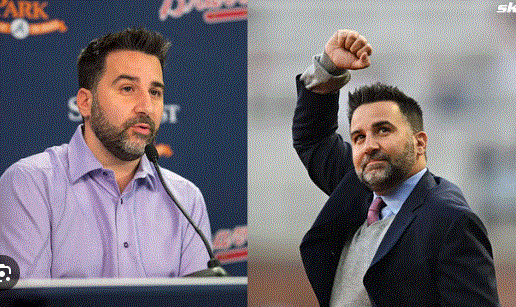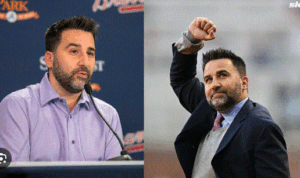
The Atlanta Braves are facing a multitude of problems this season, but perhaps none is more pressing—or more frustrating—than the ongoing disaster that is their bullpen. What’s becoming increasingly difficult to ignore is how general manager Alex Anthopoulos chose not to strengthen this area during the offseason. That decision, once merely questionable, is now starting to look like a serious miscalculation that’s hurting the team’s ability to win close games.
Statistically speaking, Atlanta’s relief pitching ranks among the worst in Major League Baseball. The bullpen has posted a 3.86 ERA, which places them 17th in the league—barely average. Their FIP (Fielding Independent Pitching), a metric that focuses on the outcomes a pitcher can control (like strikeouts, walks, and home runs), sits at 4.12—ranking 20th overall. Even more damning is their collective fWAR (Fangraphs Wins Above Replacement) of -0.3, placing them 26th in the league. That essentially means the bullpen is actively hurting the team more than it’s helping. And for a club that’s played in more one-run games than any other team this season, a shaky bullpen is a recipe for disaster.
This past week alone served as a painful reminder of just how fragile the Braves’ bullpen is. On Thursday, against the Arizona Diamondbacks, the team managed to surrender a six-run lead in the ninth inning—a collapse that would be devastating for any team, let alone one with postseason aspirations. The very next night, the San Francisco Giants walked them off in extra innings, scoring the winning run on a wild pitch. Then came Saturday’s heartbreaker: a walk-off, two-run home run given up with two outs in the ninth. Three games, three losses, all because the bullpen failed to do its job.

Pierce Johnson played a role in a couple of those meltdowns, but his presence in those high-leverage situations is itself a symptom of a bigger issue. The bullpen was operating without a reliable closer because Raisel Iglesias, the pitcher expected to hold that role, has been performing so poorly that he effectively lost the job. While it’s fair to hold players like Iglesias accountable for their underwhelming performance, it’s equally important—if not more so—to question the decisions that led to this lack of depth and reliability in the first place. That trail leads directly back to Anthopoulos.
Calling the current state of the bullpen a failure might even be too kind. Anthopoulos knew going into the offseason that the bullpen was in need of reinforcements. He was fully aware, as early as last October, that Joe Jimenez might miss the entire 2025 season. He also allowed A.J. Minter, a reliable and proven arm, to walk in free agency. Between those two pitchers alone, the Braves lost over 100 innings of solid, high-pressure relief pitching. Both of them posted ERAs of 2.62 last year, numbers that clearly underscore their value. Yet no moves were made to replace that production.
This kind of negligence is hard to understand. How could a general manager of a contending team overlook such a glaring hole in the roster? Some fans have tried to excuse the lack of action by suggesting that Liberty Media, the company that owns the Braves, placed financial limitations on Anthopoulos. But that argument doesn’t hold much water when you take a closer look.
First, the Braves had already agreed to a $50 million deal with reliever Jeff Hoffman—an indication that they were willing to spend significant money to address the bullpen. The only reason that contract didn’t go through was due to a failed physical. Second, they were actively pursuing Tanner Scott, who ultimately signed the most lucrative contract for any reliever during the offseason. Both of these pursuits show that the front office knew the bullpen was an issue and that ownership was willing to spend to fix it.
Even if we play devil’s advocate and assume the team hadn’t been willing to spend, the bullpen market is not only for the wealthy. Solid relief arms are not particularly rare; in fact, good relievers can often be acquired through shrewd trades or budget-conscious signings. Anthopoulos didn’t need to sign the top closer in baseball. He just needed to find dependable depth—and he failed to do so.
To suggest the Braves had no choice but to scrape the bottom of the barrel for minor-league contracts is disingenuous. This is not a team operating in poverty. This is an organization with a contending roster and legitimate postseason expectations. That kind of excuse doesn’t hold up, especially now that we’ve seen how this oversight has already translated into lost games. Analysts estimate that the bullpen has cost the team between five and ten games already—and we’re still in the first half of the season.
Ultimately, while several people bear some level of responsibility for the mess the bullpen has become—underperforming pitchers, coaching staff, etc.—there’s no getting around the fact that Anthopoulos’ lack of proactive planning is the primary reason the team is in this position. His decisions, or lack thereof, have had a cascading effect on the team’s performance in tight games.
In summary, the Braves’ bullpen issues aren’t just the result of bad luck or player regression. They’re a reflection of poor roster management and a failure to respond to obvious personnel changes. The front office had opportunities—multiple ones—to correct course before the season began. Instead, the team is now dealing with the consequences, and it’s likely to get worse before it gets better unless major changes are made. Anthopoulos may be respected for past success, but in this case, he must be held accountable for a misjudgment that’s clearly dragging the team down.
Leave a Reply